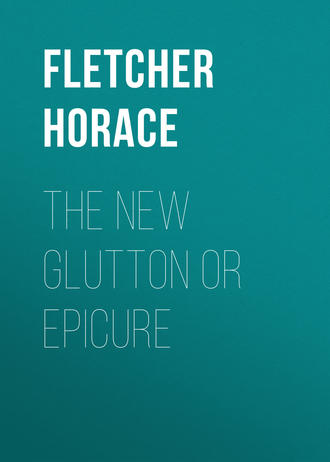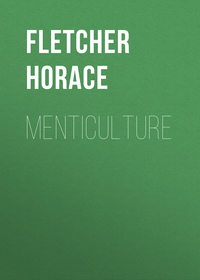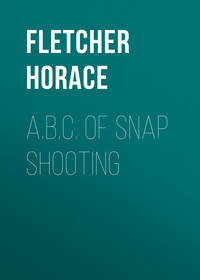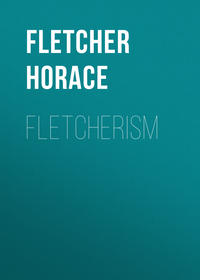 полная версия
полная версияThe New Glutton or Epicure
The author spent an hour with Dr. Alexander Haig, of London, while undergoing the Cambridge University Examination reported upon by Sir Michael Foster, and exhaustively argued the claims of thorough mouth treatment of nutriment to that distinguished dietetic specialist. The argument met with much incredulity, as has been the case in all first presentations of the idea. Dr. Haig pronounced the appeal to even a normalised appetite dangerous, and clung to the prescription theory of regulating food. He seems, however, to have since learned the efficacy of munching and tasting in assisting the empirical prescription method, and now recommends it as enthusiastically as do Drs. Van Someren, Higgins, Kellogg, and Dewey. He has even sent patients to a resort in the country in England to acquire the habit of munching where there was present in them the strong pernicious habit of nervous haste and inattention in connection with their ingestion of food.
This is bound to be the case with physicians where the subject is given attention and the method is accorded a fair trial without lapses. Credit for the origination of the suggestion is here taken to increase the effectiveness of the claims presented in the "A. B. – Z. of Our Own Nutrition" and in this book. Readers are recommended not to imitate the prevalent error of thinking that so simple a suggestion is not important or otherwise scientists would have proclaimed it long before now. The ancient hypotheses of text-book physiology were mainly based upon the study of nutrition, beginning in the stomach, and after the danger of indigestion had been forced upon the alimentary system; and hence they often dealt with confused, abnormal, and pathologic conditions, and they rarely had opportunity to observe the normal condition intended by Nature.
Professor Pawlow, of St. Petersburg, confirmed the necessity of a right psychic environment; Dr. Cannon, of the Harvard Medical School, showed the influence of mechanical thoroughness and nervous shock upon digestion; and Dr. Harry Campbell, of London, explained the mechanical and salival efficacy of mastication in procuring good assimilation of nutriment and an economic nutrition. The work of Professor Pawlow and Dr. Cannon was independent scientific research, and so was that of Dr. Campbell; but the latter was undoubtedly suggested or stimulated by Dr. Van Someren's presentment of his paper to the British Medical Association. The investigations of Sir Michael Foster, Professor Chittenden, Drs. Higgins, Kellogg, and Dewey were directly inspired by the author in connection with his Venetian colleague, Dr. Ernest Van Someren. The papers, reports, articles, and lectures of these authorities are given in the "A. B. – Z. of Our Own Nutrition," and are repeatedly mentioned in this volume because this book is revised and reissued as an extended explanatory companion of the larger scientific presentation.
In pursuit of true menticulture the personality of the individual should be completely suppressed. He becomes the agent of his inspirations, his revelations, or his altruistic convictions, and as such speaks for the ideas presented, and in no immodest spirit of vain egotism. In descending from the plane of high literary propriety to impress by simile and analogy, the object foremost in mind is to attract a variety of sympathies. The author reveres the dignified in art and in demeanour, and deplores the necessity of personal association to spread the merits of what he believes to be fundamental truths of the philosophy of true living. But so strong is the conviction of the author that he possesses fundamental truths which have been overlooked in the rapid progress of the race in the luxuries of living, that where it is seemingly desirable to employ unusual means to attract attention he feels compelled to do so.
SPECIMEN ECONOMIC DINNER
IN ASUMPTUOUS MODERN AMERICAN HOTELThe author was invited to dine with some friends one evening in summer at a hotel in New York, and the invitation concluded with "Menu à la Fletcher."
The dinner was to be served in the sitting-room of my host, and when I arrived had not yet been ordered. "You must order the dinner for us," said my host, "and we will agree to your selection." "But I cannot order for any one but myself," said I in reply. "The chief contention I make for natural nutrition is that the appetite is the only true indication of the bodily need, and you must interpret your own appetite both as to estimated quantity required and the sort of food craved."
After some discussion I agreed to stand as go-between and take the symptoms of appetite from each and give the order. The waiter was standing by with pencil in hand and urged a number of expensive dishes that were the specialties of the day. I asked him to "be quiet, please, and let us make our own selection." I first placed the bill of fare in the hands of the daughter of my host and asked her to name the first thing that came into her mind in connection with the order. She replied, "Baked potatoes and – " "Stop," said I; "baked potatoes it is; now it is your turn to choose, R – . What comes first to your mind?" "Green corn," was the answer. "Very well, waiter; one order of baked potatoes, one order of green corn, and a lemon ice. Bring these and we will order more if we require."
The waiter hesitated and was about to protest something when I stopped him with the assurance that the order given was all that we would specify at first, and that if the service was unusual and caused trouble we would submit to an extra service charge to square accounts.
While the order was being filled there was considerable funmaking, but I would give no explanations. The waiter returned shortly with the order as given, and it was laid out to the accompaniment of a complete dinner utensil service. I asked the young lady to please prepare one of the potatoes in the way she liked best, and this was done by taking the mealy heart out of the jacket and mixing it with butter, salt, and pepper to taste. In the meantime the father had taken an ear of corn and was prepared to enjoy it in response to his appetite the same as he would if he were in the woods with a lumberman's appetite and only corn to be had. The large glass of lemon ice was then placed between us as a "centrepiece." "Aren't you going to take your ice now?" queried the young lady. "Not now," replied I. "I must attend to your method of taking your potato to see that you do it economic justice, and I must see that your father does not waste any of that delicious corn. Now, Mary, let me see how much good you can munch out of your first mouthful. Do not swallow any of it until it is actually sucked up by the Swallowing Impulse, and when that happens you will note that only a portion of it is taken and the rest will naturally return to the front of the mouth, if you do not restrain it, and will still be a delicious liquid most agreeable to taste." This happened as suggested, and there were three distinct swallowing acts before the last of the mouthful had disappeared in response to the Swallowing Impulse. "My! but I never realised that potato was so good," exclaimed the young lady; and "Gracious! isn't this corn bully!" echoed the father. "Good!" added I. "If that is true of the first mouthful, I think you will find it true of the other mouthfuls until your appetite for potato and corn is satisfied; and as long as your appetites hold good for them, you are being nourished as your body-needs require." With the slow eating, the appetite of each for the chosen food was soon quieted; one, we will say for illustration of the principle, with a single potato and the other with a single ear of corn. "I think I should relish a little of your second potato if you are not going to take it," said the father, addressing his daughter; and she replied, "Your corn seems nice, father; may I have your second ear in exchange for my potato?" This was agreeable to each, and each partook somewhat of the other's original selection until the appetite of each was so completely satisfied that neither could more than taste a little of my lemon ice as a final delicacy; and as I did not want all of it, the one order sufficed for us. I had breakfasted quite heartily at one o'clock in the afternoon, after having written several thousand words of correspondence, and really wanted but half the generous portion of ice that had been brought. I had ordered it set into ice-water, after placing it ceremonially as a centrepiece, and it had kept its icy consistency waiting for what I thought was likely to happen.
Both my host and my hostess declared that they had never enjoyed a summer evening meal more, and yet all that was ordered was not consumed, while the cost, for the three, was less than a dollar for the food alone.
The method employed to interpret appetite was a revelation to my friends. They were accustomed to ordering several courses for each person, although they thought they were "small eaters" and economic feeders. Had they ordered for us three without my assistance, the dinner would not have cost less than four or five dollars, and with a plethora of food on the table all would have felt it necessary to eat as much as possible, in order to get value received.
The above, as related, was an actual happening, but it in no way indicates what another trio would have ordered in response to their appetites. That is immaterial. The principle of consulting the leanings of appetite is the thing of first importance, and giving appetite a chance to naturally discriminate is the second natural requirement. Had the weather been cooler, and had the appetite earned been like that of a labouring man, more food and more variety might have been required to satisfy appetite, and hence the needs of the body. In that case, after plying the appetite to repletion on the first dish ordered, a second or a third could easily have been added. With this principle of learning the real demands of appetite, any number of combinations can be had for variety. In summer, with light physical exercise, very little proteid-bearing food is needed; but in winter, with vigorous exercise or hard physical labour, the appetite will crave foods that have proteid and fat whether one knows what proteid is or the difference between carbohydrate elements and fat. Any empirical idea of the possible elemental requirements is likely to lead to false suggestion and do harm. It is difficult to stand by and let Nature do the ordering if there is too much elemental intelligence, and that is where the animals, when allowed free choice of food, get on better with their nutrition than man himself, and man's only protection is to carefully heed the delicate discrimination of appetite. This is not a difficult thing to do, for appetite can be easily satisfied within a small range of simple foods.
With any desired variety of sumptuous food to choose from, and no restraint from any cause whatever, the author fed himself nine-tenths of the time during the examination at Yale University, in cold winter weather, on griddle cakes well buttered and accompanied with an abundance of maple syrup. Occasionally more proteid would be demanded, – say once a week, or once in five days, – and then baked beans was the preferential choice.
I am now relating the experiences of a student of hygienic epicureanism and am not considering money economy alone. Were mental or even physical improvement in efficiency to be purchased at high prices, and lack of efficiency could be had for nothing, the high-priced article would be well worth its cost, no matter what it might be, for the reason that total lack of efficiency is equivalent to death and any proportionate lack is the next thing to death. Hence it is not a money economic reform that is being advocated, and this must be borne in mind.
When I am in New York I very often take a room at the Waldorf-Astoria because it has become, by common consent, the suburban and country business and social clearing house of the whole United States; and hence, coming from Europe periodically as I do, and always anxious to meet old friends from San Francisco, New Orleans, Boston, Washington, the great cities of the Middle West, or elsewhere, it is more easily accomplished by camping at the Waldorf than in any other way. I cannot be a profitable guest of this or any hotel kept on the European plan, but I try to make up for this deficiency in other ways. Just across Sixth Avenue from the Waldorf, on Thirty-Fourth Street, is one of the most pretentious of the so-called "dairy lunches." In these places good, appetising, wholesome food is served quickly and in decently small portions. For this very reason alone, I prefer the crowd and the noise of the dairy lunch to the quiet and the luxury of the Waldorf café or dining-room. One would not object to paying a larger price at the more quiet place of service, but prodigality seems to be the present great American sin. Were it a mere waste of money or even of the food, it would not be worthy of great discussion; for when the fool and his money are parted the laugh is on him with no grain of sympathy, and there already being a great surplus of food in the land, there is no fear of famine. But with this prodigality prevalent, so that to have a decent variety one must have put before him enough for a family, the temptation to grossly overeat is great and the abuse is criminal.
It is the hope of the author that some enterprising Boldt will inaugurate an epicurean service and charge well enough for it to pay for the trouble, or better yet, in proportion to the quantity wanted. In this regard the poor do not suffer directly, but the example of the rich is the perverter of the poor in many ways, and surely in this item of dietetic abuse.
When it comes to quantities of food to be prescribed, the author avoids giving even suggestions. This has been the trouble with the past attempts at reform. Had Luigi Cornaro told us in his autobiography the manner of taking his food with other particulars, instead of giving alone a maximum weight to which he limited himself, he might have saved the world three hundred years of uncertainty and confusion. His twelve ounces of solid food and fourteen ounces of new wine (fresh grape juice) means little. The solid food might have been almost water free or might have contained 50 per cent of moisture. The new wine contained a trifle of sugar and probably more than 95 per cent of water and supplied moisture to the body instead of water. During the Yale tests reported elsewhere, and more fully in the "A. B. – Z. of Our Own Nutrition," the daily ration did not exceed the reported amount of Cornaro, even with the most generous allowance for moisture.
I have steadily refused to prescribe by weight or quantity or to suggest the best kinds of foods for any one, but there are so many questions arising from the publicity already given by the Yale experiment, that it will do no harm to give some outline.
DIET IN THE YALE EXAMINATION OF THE AUTHOR
In the first place the selection of food for this test is no basis of general choice. The analysis of food for its elemental molecule values, and for its heat content, is a very difficult thing to do and takes much time; hence to bring a large variety into a diet during a test would entail enormous labour on the laboratory staff. Knowing this difficulty, when I was requested to choose something which would entirely satisfy my sense of taste gratification so as to best stimulate the flow of the digestive juices, I chose a cereal with a known content value. That is to say, I fed from different brands of cereals, the content value of which was known. A quart of fresh milk a day furnished the moisture required, and was not every day entirely consumed. Maple sugar was the most variable ingredient of the diet in regard to quantity. Of the milk I took nearly or quite one quart each day, of the cereal I averaged about 150 grams, or say 5 ounces, and the demand for the sugar varied from 150 grams to 200 grams, or say 5-7 ounces.
This food was taken in at two meals daily, – 12-1 and 6-7 P.M., – and the time required in taking was 12-14 minutes to the meal, including any delay necessitated in taking notes and in weighing the food. These delays were inconsiderable, however, as facilities for weighing and taking notes were perfected and their use well accustomed by the subject. The 26-28 minutes per day, then, may be set down as the careful but industrious eating time required to satisfy the waste and appetite of a man doing 'Varsity Crew work, as reported by Dr. Anderson and Professor Chittenden.
The activity outside the prescribed gymnasium exercises and any supplementary work consisted of awaking very early in the morning and doing considerable writing upon my typewriter. The agitation of this nutrition investigation has involved an immense amount of correspondence to keep the interest stimulated, and for the exchange of information between the interested parties; hence in addition to serving as test-subject, there was always much else to do to keep from getting hopelessly behind in the work.
The writing began anywhere from four to six in the morning in winter, which was the season of the test, and continued until about seven or eight, when the exercises were commenced and continued until finished. Meantime the mail of the morning had come in and frequently demanded immediate attention, which used up the time until between twelve and one o'clock, when a first-class appetite had been earned (no craving of hunger or "all-goneness" in the common form due to the persistence of habit hunger), and this insured a keen appreciation of taste and fulfilled all the requirements of a healthy digestion. The afternoon was always busy, sometimes with a lengthy walk around town, or a game of billiards when the weather discouraged outside work. The evenings were strenuous or restful, and were usually employed with conversation, reading, or a lecture.
Fortunately the simple food selected continued to be agreeable to the end, and cost an average of only eleven cents per day. When it was given up to accommodate the service furnished by social meals it was missed, the habit of supply having become somewhat fixed and expected by appetite.
In London, in search of the lowest possible economy, the author has subsisted on about half the cost of the Yale supply; and it is entirely possible to those needing strictest economy.
INFLUENCE OF SUGGESTION
A friend of the author, who is an enthusiast in regard to the profitableness of an economic nutrition in assisting the strenuous life, went to lunch with a generous host in New York the other day, when the following conversation about the lunch to be ordered was heard. It partook of Wall-Street brevity, which is thought to be necessary in the rush of a midday snack or meal.
"What will you have? What! only a baked potato and a bottle of ginger ale? All right for a starter; but what are you really going to have? Nothing more! what is the matter with you? Come, now; tell me what you want for lunch? Stocks are badly off, but I haven't reached the starvation point yet. Don't treat me like that when I'm trying to treat you right and white. Brace up, old man, and have something to eat."
The intermediate replies can be imagined as in an overheard telephone conversation.
The host ordered for himself, as usual, a portion of tongue and a generous garniture of side dishes, and watched his guest with amused tolerance. The lunch proceeded, interlarded with talk about topics of mutual interest, and when a final halt was called the host had not taken more than one-quarter of his cold tongue and very sparingly of the accompanying side dishes. The guest had finished one of his baked potatoes, and had sipped his ginger ale enjoyingly, but had not taken more than half of the pint ordered. The appetites of both host and guest were amply satisfied, but without any of the heaviness which follows an unrestrained "hearty" meal. In tones of surprise the one-sided conversation, relative to the strangeness of the proceeding, continued as follows: "Well, I'll be switched! How in Wall Street did that happen! I haven't eaten half my usual lunch, and yet I have killed my appetite deader than the Ship Building Trust. I'm blessed if I can understand it. The blamed thing is uncanny. I don't believe it's true, but I'm satisfied all right even if I am hypnotised. Come and lunch with me every day. You're engaged as a regular companion boarder, and Freddie will pay the freight. You're cheaper than nobody. Come again! Come again!! Come always!!!"
The above is not an unusual case. The personal influence of the author and of his active colleagues has been visibly noted among parties where there was no sympathy with the "starving fad," and where there was even stubborn opposition to the thought of such a thing. But these same groups of non-interested objectors have visibly decreased their accustomed lunches and dinners, and some of them have found that a cup of coffee and a roll, the same as is habitually taken in Europe, outside England, serves as a breakfast better than the full meat affair formerly taken. They persist in declaring that they are not influenced by the chewing suggestion, but they show signs of some restraining influence, and observation reveals that in such groups the common annual and quarterly attacks of illness are less frequently or less severely suffered.
There is no doubt that Luigi Cornaro gave appreciative attention to his four three-ounce meals a day, and in giving attention properly insalivated his food. The inference is warranted. A man full of vigour and health and constructive energy such as Cornaro reports that he had in unusual abundance is not likely to confront a three-ounce ration of delicious food and proceed to bolt it as a dog bolts a piece of stolen meat. It is a matter of easy observation that a child given a single piece of sugar or sweet in any form will make it last as long as possible and get all of the taste out of it by most ingenious conservation; but the same child, if offered a box of "goodies" as it is passed around, or whenever the time given for possession of its contents is limited, will show the greed of a predatory or hunted or habitually maltreated animal and will not only grab as much as possible but will cram all possible into his stomach to satisfy the sense of greed, and then usually suffers the consequences of the double sin in the sickening re-taste of the gases of indigestion.
Cornaro undoubtedly made his three-ounce meals last as long as possible in order to enjoy the maximum of taste, and in so doing satisfied the natural requirements of appreciative attention and thorough insalivation. In like manner two small tumblers of the fresh grape juice (new wine – fourteen ounces), which he took as his sapid liquid in the course of a day in connection with his four meals, would allow only a sherry glass quantity to each meal, and with such a limited supply a person is not likely to toss off the liquid in great gulps as water is drunk to satisfy thirst, but it rather would be enjoyed as the wine-tasters enjoy wine, by their sipping practice, in pursuit of their profession. The influence of visible supply or of passing or permanent opportunity of possession is a most powerful suggestion in the cultivation of economy or prodigality, of greed or moderation, of healthy nouriture or plethoric indigestion.
Man was constructed and intended to hunt his food among the grains, nuts, roots, and other fruits of earth, and in hunting food to earn a keen appetite. He found his food scattered and ate it as he found it, with the true appreciation that difficulty of possession gives. In the primitive state the requirements of natural digestion are safeguarded; but with a plethora of food cooked and spiced and furnished with superfacilities for ingestion, the natural protection of difficulty is removed, and the victims of the luxury drop unconsciously into habits of abuse, like the overeating of to-day.
In order to escape the surrounding temptations it is necessary to have always in mind protective counter-suggestions which intelligently make use of the abundant and easy supply but limit the intake to the needs of the body as expressed by appetite when permitted to discriminate in its natural deliberate manner, and which only keeps pace with the natural dissipation of taste in the process of requisite insalivation. The chewing practice is but a means to this natural end, but it is a most important means, the same now as when teeth were used instead of patent grinders, and when taste took the place of spices and sauces and manufactured its own delights by the chemical action of saliva.





